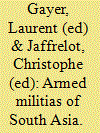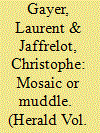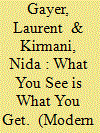|
|
|
Sort Order |
|
|
|
Items / Page
|
|
|
|
|
|
|
| Srl | Item |
| 1 |
ID:
093293


|
|
|
|
|
| Publication |
New Delhi, foundation Books, 2009.
|
| Description |
xiv, 276p.
|
| Standard Number |
9781850659778
|
|
|
|
|
|
|
|
|
|
|
|
Copies: C:2/I:0,R:0,Q:0
Circulation
| Accession# | Call# | Current Location | Status | Policy | Location |
| 054664 | 303.620954/GAY 054664 | Main | On Shelf | General | |
| 055986 | 303.620954/GAY 055986 | Main | On Shelf | General | |
|
|
|
|
| 2 |
ID:
077583


|
|
|
|
|
| Publication |
2007.
|
| Summary/Abstract |
Karachi is a city of migrants and an important commercial hub, which provides Pakistan with a window on the world. But Karachi is also a deeply fragmented city, plagued by an acute urban crisis that takes roots in the failure of the development plans that successive Pakistani governments have delegated to foreign experts. The transnationalisation of the Afghan jihad, in the 1980s, also fuelled social and ethnic antagonisms in the city and contributed to the proliferation of violent entrepreneurs and ethnic parties. Both criminal elements and ethnic activists contributed to the ever-increasing fragmentation of urban space in the city, and to the multiplication of ethnic enclaves controlled by private militias. This extreme fragmentation of the city has benefited local jihadis and foreign terrorists who have taken shelter here since the fall of the Taliban regime in Afghanistan. However, Karachi will never be a "sanctuary" for jihadi militants, due to the hostility of local ethnic parties, whose activists see themselves as enlightened secularists at war with the most retrograde elements of their society and their foreign allies
|
|
|
|
|
|
|
|
|
|
|
|
|
|
|
|
| 3 |
ID:
119560


|
|
|
| 4 |
ID:
156513


|
|
|
| 5 |
ID:
122536


|
|
|
| 6 |
ID:
174133


|
|
|
|
|
| Summary/Abstract |
Situations of internecine warfare have in common to question the transitivity of everyday life—that is, its capacity to be taken for granted, to flow without any need for explication. These wars within the familiar generate specific anxieties about where to look at and what to believe. Events, persons, places, or objects whose status seemed hitherto undeniable become less predictable, while their worth comes into question. As individuals’ ontological security is threatened, the need for new monitoring devices and authentication procedures arises. Drawing on the phenomenology of civil wars and the anthropology of fakes, this contribution proposes to explore one such crisis of evidence: the nexus of political, ethnic, and criminal violence raging in Karachi's inner-city area of Lyari. Through the lens of local journalism, it reflects upon the tactics of social navigation deployed by residents confronted with chronic uncertainty in all sectors of life. Janbaz, the Urdu newspaper examined here, provides an opportunity to move beyond functionalist readings of the press in conflict situations. While insisting upon the pleasure derived by Janbaz’s readers from the sensationalized rendering of Lyari's predicament, we argue that the newspaper is the site of a continuous series of ‘reality tests’ and the focal point of private and collective investigations, pooling knowledge in an increasingly undecipherable environment. More than through its information, it is through its shortcomings that Janbaz has helped to recreate social ties in a world plagued by discord and uncertainty.
|
|
|
|
|
|
|
|
|
|
|
|
|
|
|
|
|
|
|
|
|